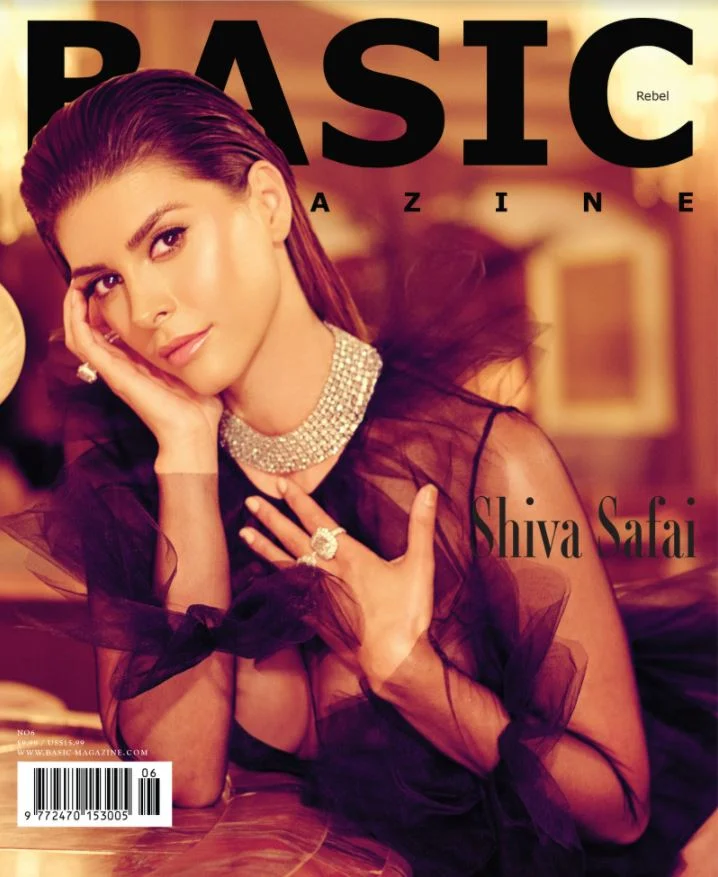RAJIV UTTAMCHANDANI
Interview by Juliet Bennett Rylah
Photography Cameron Noel Dunbar @R3dglasses Ltd.
rajiv@hersummit.org

Rajiv Uttamchandani has seen much of the world: he is Indian by nationality, was born in the Philippines, and lived in Hong Kong before moving to Los Angeles in 2003. As the founder of the International STEM Society for Human Rights (ISSHR)—a nonprofit that incorporates science and technology into solutions for eradicating violence against women and children—he also travels the globe frequently. Yet he began his career in astrophysics, looking far beyond Earth as he researched solar storms and sun spots. Then, a pair of shocking headlines caused him to pivot into activism.
Uttamchandani had been working in academia, teaching science courses at New York Film Academy, when it happened. While he enjoyed teaching aspiring artists these challenging subjects, he said he soon “became increasingly concerned with social issues overall, especially pertaining to violence against women and girls.”
This came to a head for Uttamchandani on December 16, 2012. On that date, 23-year-old Jyoti Singh and her friend, Awindra Pratap Pandey, were attacked on a private bus in Delhi, India by six men they had never met before. Pandey was beaten, but survived. Singh, however, was raped and beaten with such viciousness that she died in a Singapore hospital on the 29th. The case received global attention due to its unfathomable brutality.
“It shook the nation and it shook the world. After it happened, I said, ‘I can’t stand idly by and keep trying to achieve my own dreams.’”
He began volunteering for various organizations, donating, and “signing Change.org petitions left and right,” but it wasn’t enough. While important, Uttamchandani kept feeling that he needed to do more than “comfort zone” advocacy. Then, in August of 2014, terrorist organization ISIS raided Sinjar, a town in Northern Iraq, murdering men and enslaving women and children. Horrified by the news once more, Uttamchandani began to have increasingly negative thoughts about humanity and the amount of evil in the world until a monumental conversation with a friend.
“He said something I have never forgotten, something I will take to the grave. Focus on the solution, not the problem. And that is exactly what I did.”
Uttamchandani decided to use his background in science and technology in pursuit of those solutions and founded ISSHR in January of 2015. ISSHR has multiple chapters and initiatives, including research into the root causes of violence, and a variety of projects under the umbrella of H.E.R. (Humanity Education & Rights).
One of the biggest pieces is H.E.R Rescue. It’s a smartphone app that can be activated by voice or touch when the user feels threatened. The app begins recording audio and video, which it uploads to a cloud server. It also sends GPS coordinates and other pertinent information to local law enforcement, and sends a distress text and email to emergency contacts. The app even makes a note of the user’s battery and signal strength.
The app launched in India in August of 2016 and is poised to launch as a pilot program in San Diego once approved by the Department of Justice. Uttamchandani said users will eventually be able to use the same app in other parts of the world, without downloading additional versions.
“There have been a number of cases [in India] where there has been a violent situation, the app is activated, and police come,” he said. “If [the user] had not had this product, who knows what would have happened? I tell my team that even if we have one success story, all of the finances, energy, and time that we spent on this has been worth it.”
Uttamchandani also volunteers his time to shelters and safe houses in L.A., San Diego, and India, offering science education (which may be applied towards a degree), guidance, and mentorship to homeless and trafficked youth. Long-term goals include establishing relationships with victimized women and children, providing education and employment services to ensure future success and freedom from trafficking, and empowering them to help others in similar situations.
“I firmly believe that a lot of real social and grassroots change can come from former victims of human trafficking and abuse themselves,” he said. “It’s very empowering to know that you can use your experience and make sure that nobody else experiences the same thing.”
You can join Uttamchandani by becoming a volunteer, or purchasing items from the H.E.R. Apparel clothing line. Launched September 14, the clothing is gender- neutral and made from organic hemp harvested by women in Northern India. Uttamchandani hopes to market the clothes to men specifically “because we want men to be more comfortable with the idea of supporting women’s rights [and] being called a feminist.” As the line expands, the goal is to employ and empower even more women.

You may also like
-
Chloe Coleman: From “Big Little Lies” to Big-Name Collaborations – The Journey of a Rising Star
-
BREAKING DOWN WALLS: An Interview with Rising Pop Star AJ MITCHELL
-
FROM BEDROOM COVERS TO GLOBAL SENSATION- An Interview with JESSIE MURPH
-
KAT’S INSTINCT
-
LIMITLESS WITH BAI LING
-
BASIC TALK WITH DANIELLE PANABAKER